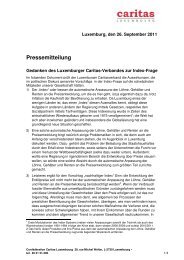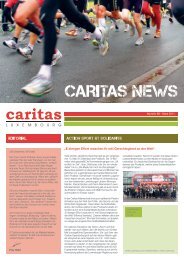Sozialalmanach - Caritas Luxembourg
Sozialalmanach - Caritas Luxembourg
Sozialalmanach - Caritas Luxembourg
Create successful ePaper yourself
Turn your PDF publications into a flip-book with our unique Google optimized e-Paper software.
ates were bad for consumer demand and therefore for the economy as a whole. In addition,<br />
global demand contracted even further in the wake of Asian financial crisis, when Asian<br />
emerging economies started to hoard reserves so as not to become dependent on IMF<br />
loans in hard economic times.<br />
Fitoussi 42 argues that the crisis is rooted in the problem of reverse income distribution,<br />
both in the United States and Europe, fatally depressing global demand. Looking beyond<br />
the aftermath of the crisis, he proposes new indicators of social and economic progress<br />
and prosperity, considerably expanding the narrow focus on GDP as the foremost figure<br />
of economic vitality.<br />
6. The Contours of Embedded Globalization<br />
The core lesson that has emerged from the crisis is that economic markets are not selfcreating,<br />
self-regulating, self-stabilising, and self-legitimising. While this important lesson<br />
is certainly not new, in the past decades of neo-liberalism policymakers do seem to have<br />
forgotten the fundamental truth that the benefits of global economic interdependence rely<br />
heavily on robust domestic and supranational, social and political institutions, reminiscent<br />
of the era of embedded liberalism. Domestic and supranational institutions must be able to<br />
bind, bond, and bridge advanced polities, economies, and societies. Unfortunately, however,<br />
once the genie is out of the bottle, it is far more difficult to re-regulate an economy than to<br />
deregulate it. And as deregulation brought concentrated wealth to sectors that benefited<br />
from even further deregulation, accumulated wealth was efficiently translated into a strong<br />
financial lobby in London, New York, and Washington. The financial sector effectively<br />
bought political power. Therefore, the failure of politics lies in part in its inability to resist<br />
being hijacked by financial interests.<br />
The excesses of deregulation have hit society hard. Public institutions and authorities<br />
matter, in fact, they have proven to be indispensable. Nobody expects the demise of the free<br />
market system, but we do witness the passing of the neo-liberal ideology that went along<br />
with it – at least insofar as that ideology can be defined as a system of beliefs that steers<br />
towards a desired credible outcome. This ideology elevated the free market to the status of<br />
an ultimate goal and an enlightened ideal, rather than one of many possible means by which<br />
society can increase its prosperity and well-being. The crisis seems to have debunked this<br />
ideology: the free market is now seen as a means rather than an end. Re-establishing the<br />
rules of the game and the relationship between the market and the public authorities has<br />
42 Fitoussi (2009).<br />
167








